How Setting Limits Improves Your Productivity, Time-Management, AND Decision-Making
Oct 03, 2022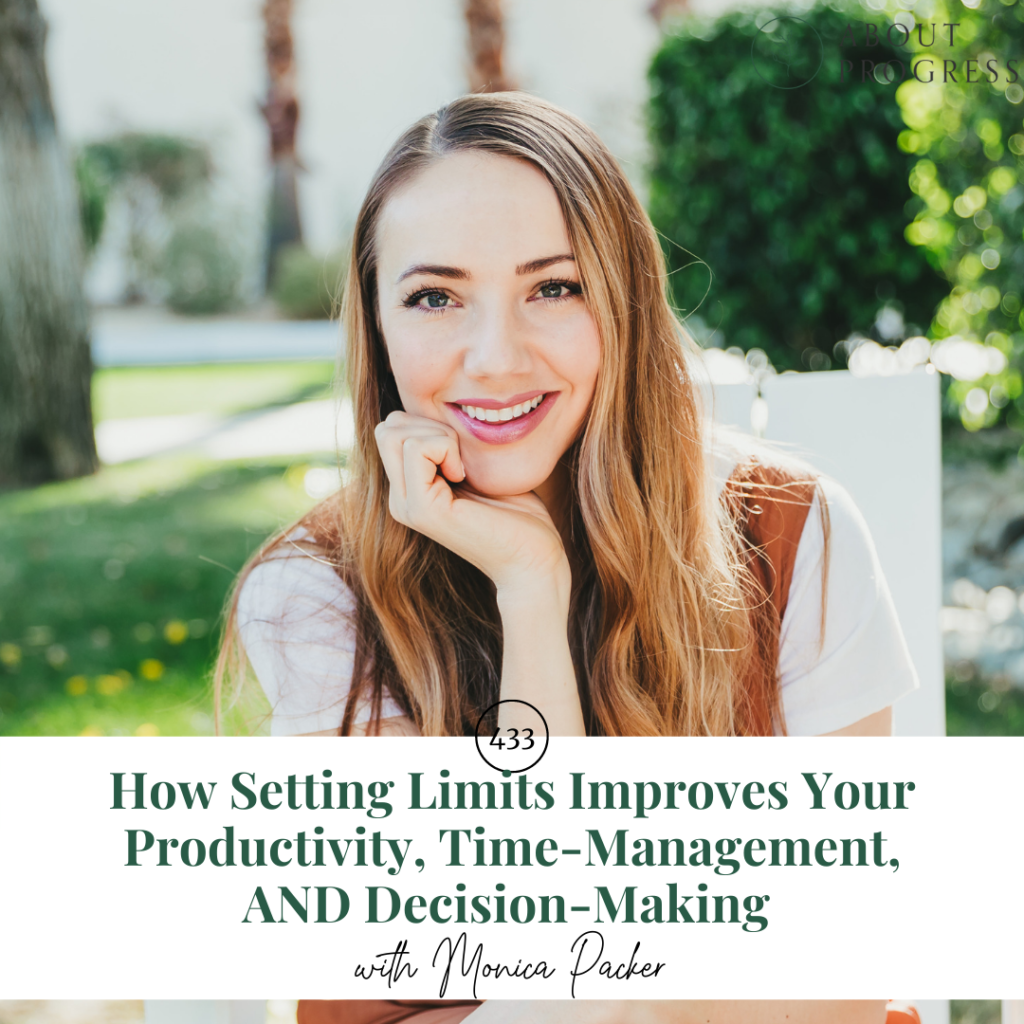
Earlier this year I shared how everything changed when I learned to accept my limits. I have been using this approach with myself and my one-on-one coaching clients and seeing a lot of success, so it's time to share more with everyone. This is a super practical episode, full of the real ways you can set limits to improve your productivity, time-management, and decision-making.
I break down the biggest pointers under each one of those categories, and include how this has played out in my real life. You'll hear about everything from our recent car purchase, to my laundry methods, to how I manage work time and family time throughout my days. You don't need to do things the exact same way that I do them, but you will be prepared to take these methods and find ways to apply them in your real life right away.
Feel like you just got fire-hosed, but in a good way? Get all of these pointers in an infographic by signing up for my free Go Getter Newsletter!
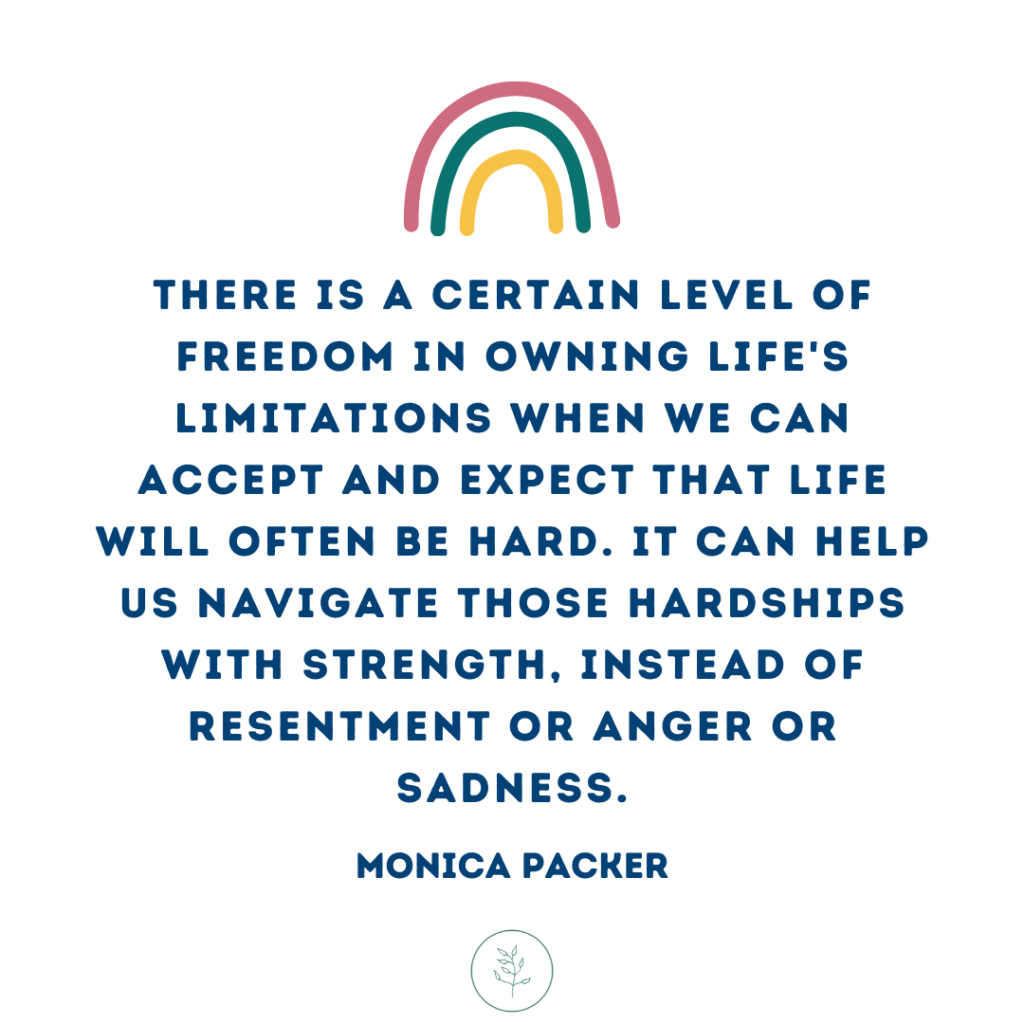
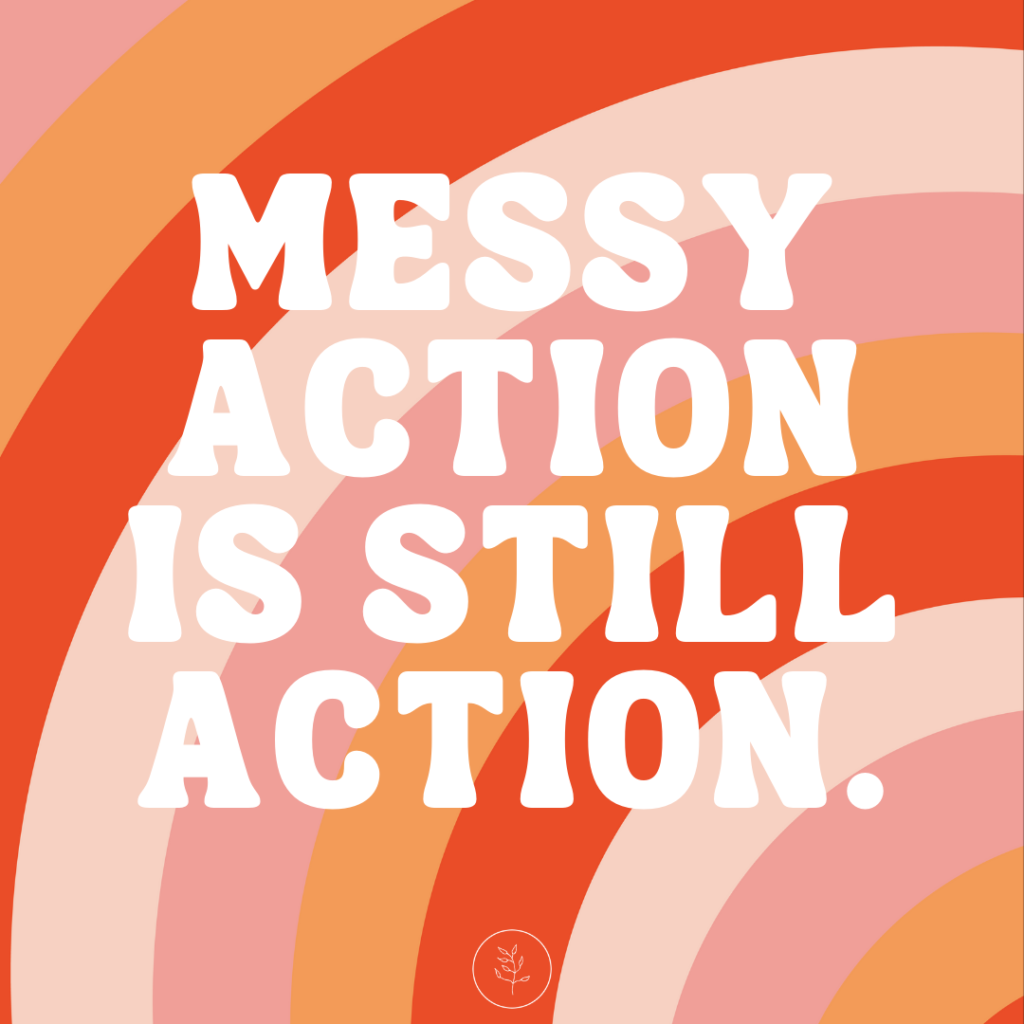
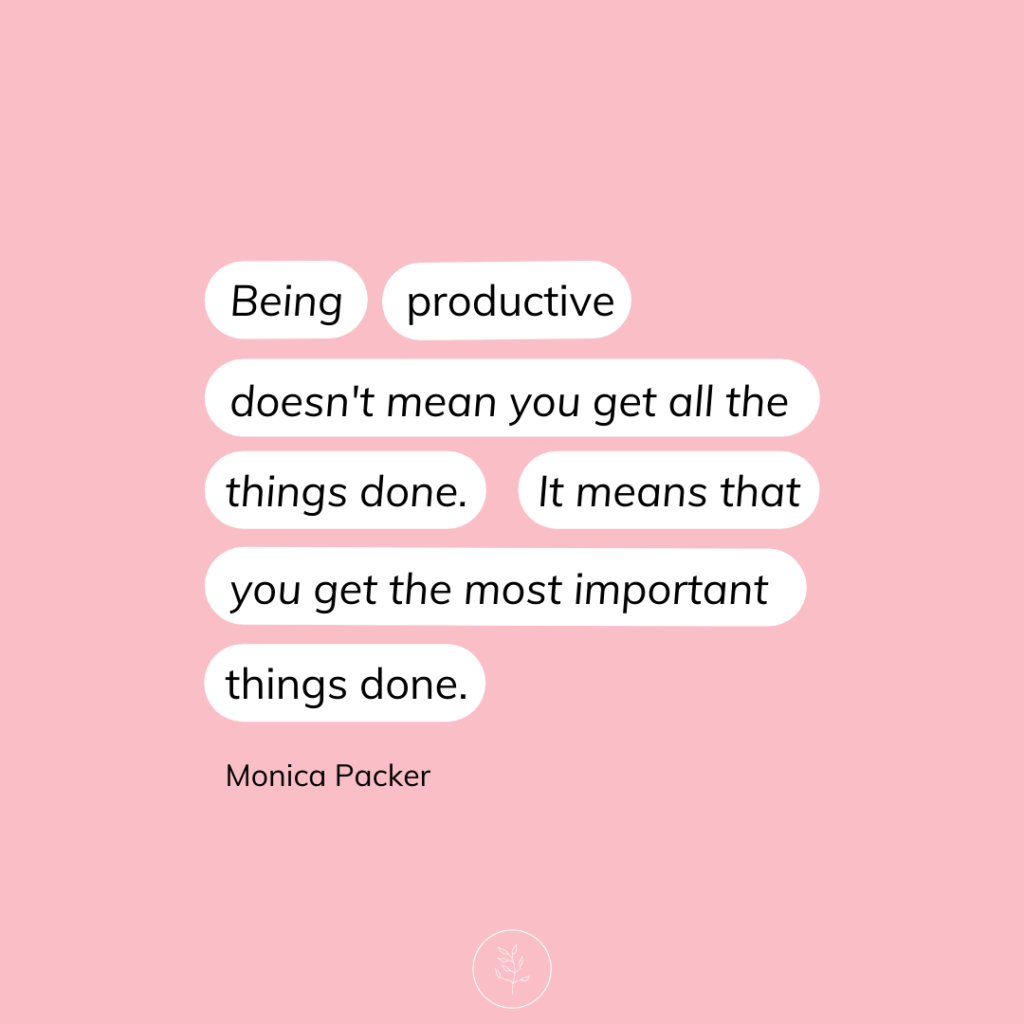
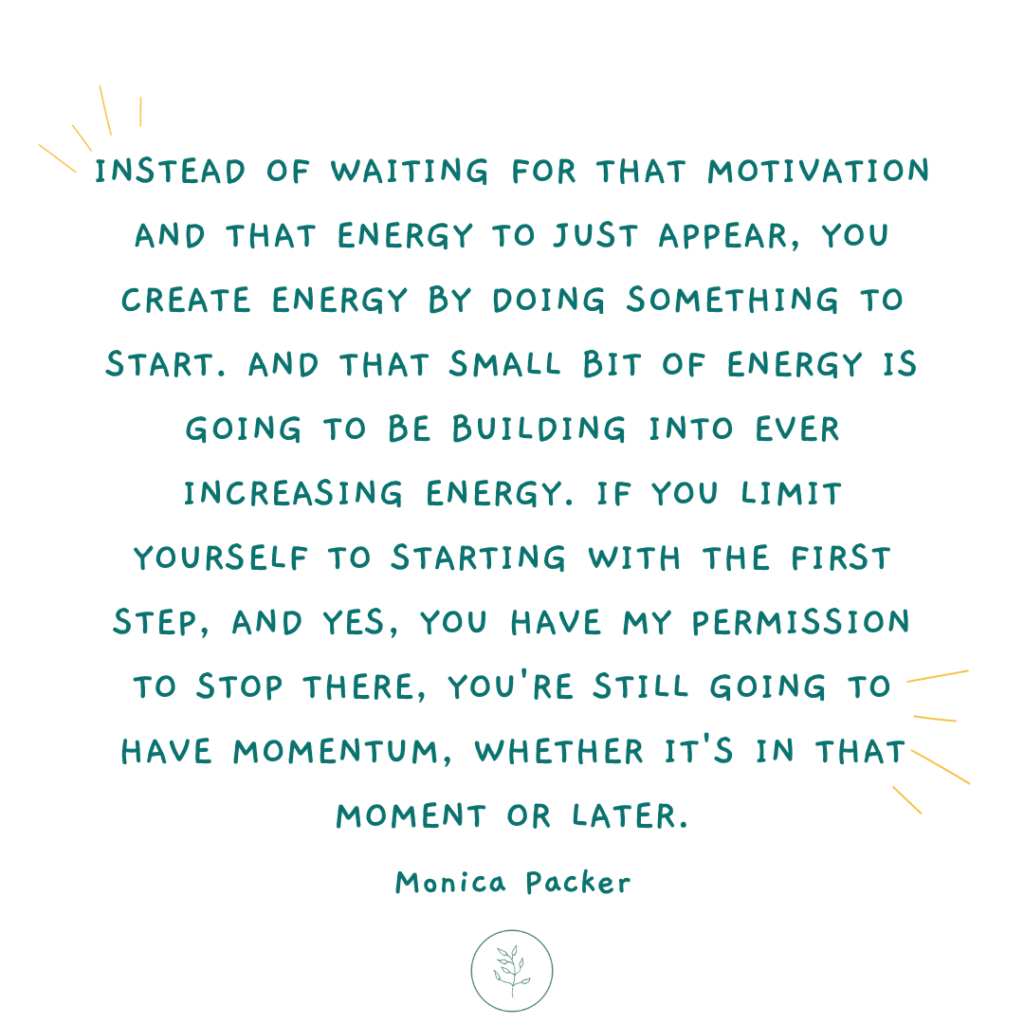
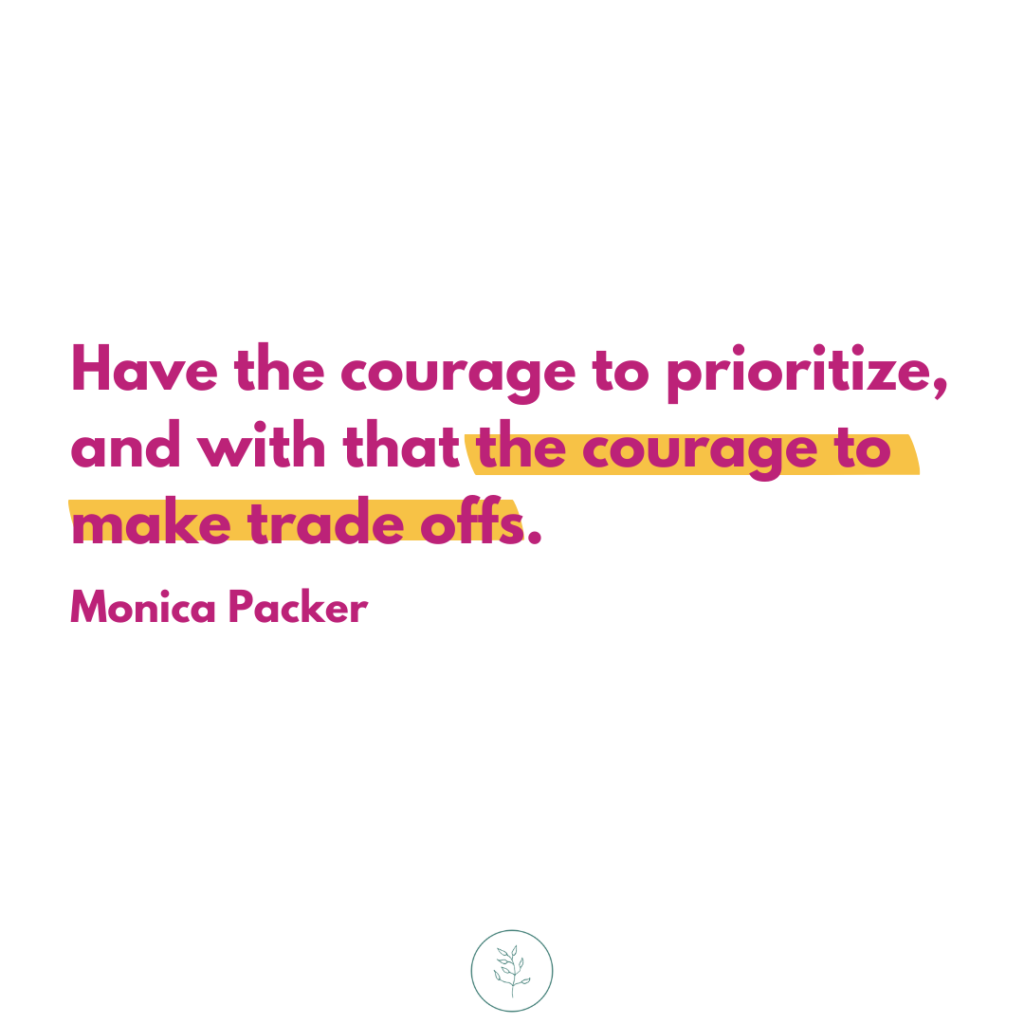
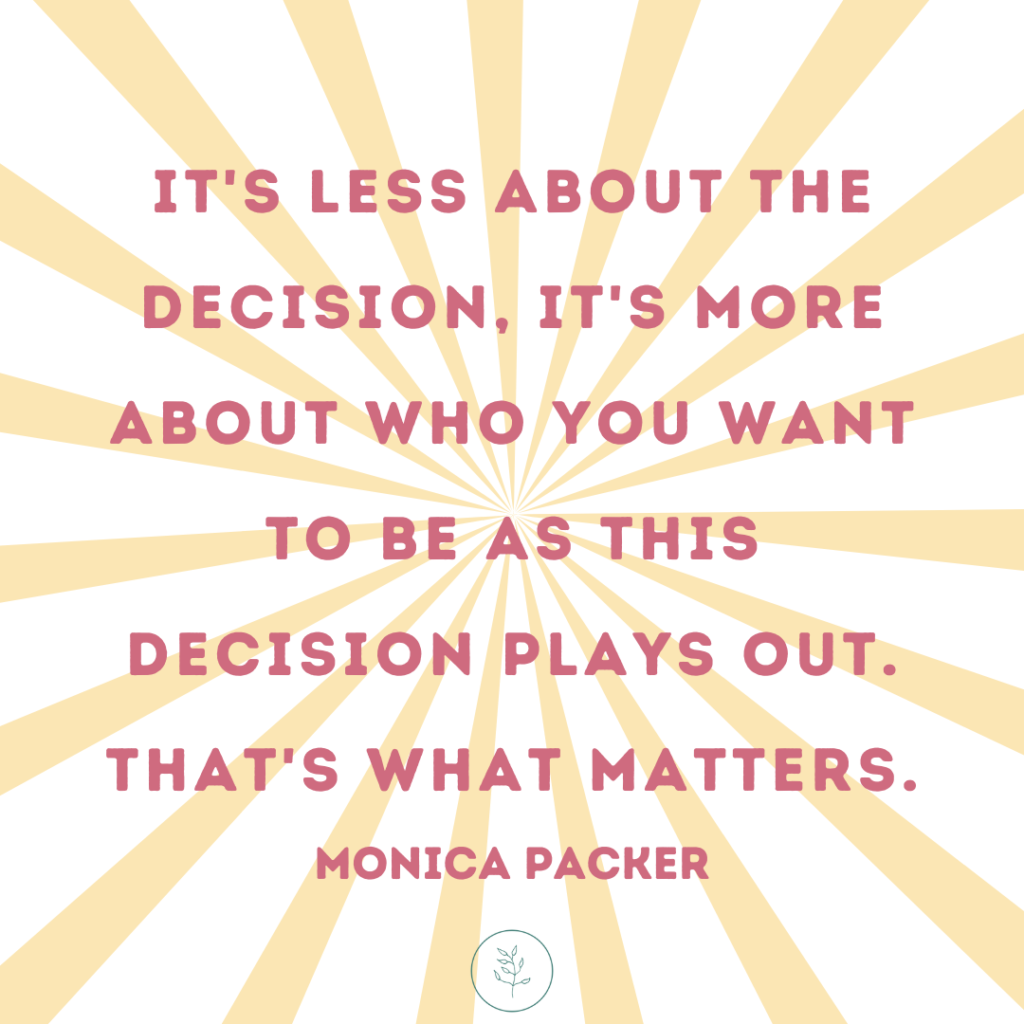
About a few other things...
Do you struggle to create habits that stick? It's not your fault. The truth is simple: you've been trying to form habits using methods designed for perfect robots--not real women living real lives. It's time to change that. If I could help you gain confidence in creating habits AND guide you to uncover the ONE supportive habit to deeply care for yourself, could you commit 21 days to learning this method? The Sticky Habit Method is a 21-day course that revolutionizes the habit-formation process. It's real habits for real women.
Sign up for the Go Getter Newsletter to get Progress Pointers in your inbox every Tuesday.
SHOW NOTES
My NEW Habit Course
Foundational course, “Finding Me.”
Leave a rating and review for the podcast!
Join the Strive Hive, my monthly membership group
Lend your voice and experience + be featured on the show HERE
Join Monica on Facebook and Instagram
Songs Credit: Pleasant Pictures Music Club
TRANSCRIPT
Monica: Welcome to About Progress. I'm Monica Packer, a regular mom and recovering perfectionist who uncover the truest model to dramatic but lasting personal growth. It's progress made practical. Join us to leave the extremes behind and instead learn how to do something to grow in ways that.
If you like practical tips about really complicated things like you're gonna hear today, then you will also love my new course called The Sticky Habit Method. In it, you'll get the practical know how you need to be confident in creating habits that last. You can find it at about progress.com/stickyhabitmethod.
I recently finished this audio book that left such an impression on me, I can't stop thinking about it. And the book is called As You Wish, by Cary Elwas, Yes, My friends, this book is all about the Princess Bride . Cary Elwes, is Wesley in the film and. It was really fun. It was him sharing about how it was made and fun anecdotes from it.
And he has an amazing gift at impersonating people, which I did not know. But one of the things I loved was hearing his own favorite memories, and Cary shared one of these memories and it's attached to a quote from the movie that is quite well known, and this is actually one of his favorite quotes too.
It's where he tells the princess "Life is pain highness. Anyone who says differently is selling something."
Like this quote, you know, there really is a certain level of freedom in owning life's limitations when we can accept and expect that life will often be hard. It can weirdly help us navigate those hardships with strength instead of resentment or anger or sadness. Now, all those emotions are appropriate, of course, but there's some freedom when we accept life's limits.
I actually say this to my clients a lot if they're facing certain health struggles or children with trials, relationships that are in trouble. We actually have to start with accepting the limitations not to stay there, but to better navigate them. I actually did a few episodes on the power of accepting our limitations and how they can set us free.
I did that a few months ago and I will link that in the show, show notes so you know, if embracing limits can set you free, which is an idea of we very much embrace here, what about harnessing limits by setting them and how they can help us in our day to day lives from conquering our to-do list, to maintaining systems in our homes to better making decisions.
This, my friends, is 100% true too. One quick example I can think of off the top of my head is about organization. Now, a while back, I'd had a whole organization course, and that's a whole story in and of itself, but as part of this course, I invited many experts on the show or not on the show, on for the audio course.
And we talked a lot about organization, obviously. And over and over again, these experts started with one piece of advice. You need to limit the amount of items you have. they always began with purging, decluttering. That was the first step to everything. I've been lucky enough to live that out because of being forced to.
I lived in a really small home in California as a family of six, and I'm grateful that we lived in such a small space because I learned the real value in having force limitations on the amount of things I can bring in and what piece that could bring in. Also, how much easier it would be to clean and organize.
That's something we can think about, right? This is an example of how using Limits can set us free and help us even with organization. Now, today is a take on limitations if you haven't picked up on that by now, but today is more of a practical take on limitations. In the past, it was more about life circumstances, right?
But instead now I want to teach you how setting limits can drastically improve three big areas in your daily life, productivity, time management, and decision making. And before we dig in, I want you to one, buckle up because you're going to get fire hosed with some practical tips in this episode in ways that have all helped me and the many women in this community, and the women I work with.
Additionally, before we begin, two quick disclaimers. Okay. The first is to, as awesome as these tips are gonna be, don't try to install them all at once. I wanna encourage you to relish these ideas and to to listen to them, but to only pick one or two that resonate with you and start there, you can always come back and do more.
Right. The second disclaimer is to not worry about writing all these tips down and remembering them cuz there's gonna be a lot. Again, just buckle up. It's gonna be a lot. I actually took care of you with this. This week's progress pointers will be a fun graphic of all the tips that you will hear in this episode, and you can get that for free by signing up for my Go Getter newsletter.
And we are switching the Go Getter newsletter to release on Wednesdays now, so there's more time. So you can go to about progress.com/gogetter. And even if this is months past the date and you still want it, just make sure you get on the Go Getter newsletter. Then email me and say, Hey Monica, I wanted that graphic from your episode about using limits to improve your day to day life.
Yeah. So, And I will send it to you. No problem. Are you ready my friends? Let's dig into the first big area: productivity.
Forgive me for having a bit in my Oprah moment there in announcing productivity. Now, the optional subtitle to this section could be called How to Use Limits to Get Shiz Done, and I'm going to share these with you all with "Limit Yourself." They all begin with limit yourself. So let's dig in. The first one is limit Yourself to the first step.
This is a trap we always fall into with productivity. We have a long to do list or we have a multi-step to do, right? Where even the looking at the list or knowing all that's going to entail that that task is going to entail, can keep us stuck at the starting line due to the overwhelm of knowing how much energy it's going to require to complete that task or to complete the to-do list.
So this is where you limit yourself by saying, I just need to do the first step of this. We've actually talked about this before in the fall of 2021, I had an episode called How to Create Momentum Instead of Waiting for Motivation. Oh, huge episode. One of my favorites actually, and the way this works is you have, you know, tasks that require big energy to do list that require big energy.
Instead of waiting for that motivation and that energy to just, poof, appear, you create energy by doing something to start, and that small bit of energy is going to be building into ever increasing energy. If you limit yourself to starting with the first step, and yes, you have my permission to stop there, but you're still gonna have momentum whether. In that moment or later, no matter what, you will experience more momentum.
So the first tip I have for you is to limit yourself to the first step. The second way to limit yourself is to limit yourself to messy action. This is for all you recovering perfectionists out there, which will likely be every single listener.
Our all or nothing built in models that are so ingrained to our subconscious can really derail our productivity because we are insisting things look or be done in certain ways. Some of those may be prescriptions from other people. Often though our internalized shoulds like ways that we just internalize it to ourselves, like it has to look this way.
And, and those standards make us not even get going with a momentum. So alongside limiting yourself to the first step, limit yourself to messy action. I have well over 400 episodes on this show, and it takes a lot of preparation for each of them, even the ones that don't sound like it. Do you know how I get so many episodes done?
It's because I allow myself to do things messy. Every single episode begins with a totally crappy outline. And that can translate to any work you need to do, right? You can messy organize the drawer. You can be okay that you don't have a fancy day planner system, and you just write one thing you want to do that day on a post-it note, messy action is action.
It goes back to momentum, right? Messy action is still action and it gets you in the zone of getting things done. The next tip I have for you is to limit yourself to numbers. Now I have a whole lot of numbers that are attached to this, okay? Some examples of limiting yourself to numbers include, limit yourself to a smaller amount of minutes that you will devote to a task. This can be responding emails. I'll say five minutes. I'm allowed to respond to these emails, cleaning a space. I'll give myself 10 minutes or longer if needed. Right? But typically I start with the smaller amount because it gets momentum going, right?
Making phone calls, organizing something, whatever it may be. Limit yourself to a lower amount of minutes and tell yourself that. Set a timer. Set it on Alexa even, sorry if I made Alexa go off for you. Okay. That's one example of limiting yourself to numbers. Another is to limit yourself to the number of items you are going to pick up.
This is something my family did growing up. I remember after we did like prayer at night, my parents would say, everyone needs to pick up 15 items and put them away. And man was that magical because it felt kind of fun and like a game. And I do this with my kids, but I also do it with myself before we watch a show before we have to leave for the day.
You know, before I move on to something else, I limit myself to a number of items to pick up. Put away. You get the idea. The next form of limiting yourself to numbers is you can limit yourself to the number of priorities you're allowed to have in a single day. If you are a to do list writer or if you just keep it all in your beautiful little head or I don't wanna say big head cuz both of those seem like disses.
But let's just say you keep it all in your beautiful head. Okay? Either way, I'm betting there's a lot more that you think you can do that day than you actually can do and there's a lot of priorities in your head that you think you should be doing, that you honestly don't need to be doing. So limit yourself to the number of priorities you're allowed to have each day, and you can make this a set one.
Three honestly seems to be a great number. What are the three most important things I need to do today? And one of those can be you sit down on the couch and read a book. I gave you permission. I'm gonna give a quick example of the limiting. Numbers. Okay. So right now my strive high, my membership group is closed.
Don't worry, not selling you anything. They are doing a challenge called Let's Get Organized Challenge, and they're each working on a big organization project throughout the week and each of us are, knowing that as we move into our daily progress on this project, that we are having a limited number of minutes that we're allowed to work on it.
I set the lowest limit to 15 minutes a day, and that may seem like a lot still for many of you, so go for lower, right? But the maximum I'm telling the women to allow themselves to work on it is 60 minutes. this kind of combines a lot of things together, but a lot of the women have been reporting in on, Wow, I told myself I just could only do 15 minutes and it turned into 30 and I feel so good.
Other women have said, I just did the minimum and look how much I got done and that amount of time. Others are saying, Wow, I did it messy. And look at this, it's still better than it was before. So there's some all examples that go with the, the numbers. Okay, So just a quick recap here. Limit yourself to the first step, to messy action, to numbers.
The next limitation you can give to boost your productivity is to limit yourself to certain days for certain tasks. This is where I am thinking full on routines and systems that you may have in place, such as meal planning, laundry, and other things that you may have at work that have to regularly happen, but not every single day.
I don't do this tip for everything. Okay? Like, I don't do this for laundry personally. Like I don't have one day the week where I do laundry, I do laundry basically every day. but I say me, I say, It actually should be me, Brad, and my children. We're all doing that. But there are certain ways for you to do this, like maybe you meal plan on Mondays, maybe you meet with certain people only on certain days at work. Maybe you only cook certain types of meals on certain types of days. A quick example I have for you is that I have currently four children. Fifth is on the way in January. The, the, each have a day of the week that they're assigned.
It's their day. Mondays is my oldest. The second oldest is Tuesday, and then it goes on from there. And on their days, that's their day one to start their laundry and, and to hopefully finish it. It's also their day to pray in the morning and at dinner. And it's also their day to pick the show at night while they're folding their laundry.
And that has helped a lot with routines and systems. It's also helped with family peace and harmony. So that example was limit yourself to certain days for certain tasks. The final limitation I want to offer to you to help your productivity is to limit yourself to the most important priorities. Can I give myself a little moment here to brag?
I am a professional get-shiz-done-er. I get a lot done. How you might wonder, maybe not, maybe you don't care, and that's all right, but I'm gonna tell you why I can get so much done. It's because overall I do less. I do not do all the things. Our meals are very simple most of the time. My home is not always clean, even though I love a clean home.
Laundry and car cleaning are of the lower priorities in my life. We don't have a lot of extracurricular activities. I don't say yes to a lot of things either. I can get things done because I do less limits can set you free. Being productive doesn't mean you get all the things done. It means that you get the most important things done.
Limit yourself to these most important priorities. And if you're like me, and you might be someone who gets a real trip off of getting things done, can I gently remind you and myself too that relationships, and not getting things done, relationships are honestly the most important things that we can be investing our time and energy.
I love what my friend Shirin said about this. Shirin Eskandani. She's wholehearted coaching on Instagram and she's been on the show a few times. I love her. She said it this way in an Instagram post I wanted to share with you, quote. "Productivity is a feeling. It is a feeling that only you. Can give yourself their permission to feel it happens the moment that you acknowledge this is enough, you will only be as productive as you allow yourself to feel."
Isn't that amazing? I couldn't say it better. And that's what I want you to really embrace about productivity. It's not about getting all the things done, it's about getting the most important things done.
Next up, we will move on to other two big life categories, time management, decision making, and how setting limits will help you. But first, a quick word from our sponsor.
I recently had a new friend tour our house because we did a full home renovation and she's about to do one too. And as we were walking around, we were talking about the different options and the different things you point out and the problems that came up. She asked me, How did you get so good at making decisions and problem solving?
And I had to think on it for a minute. And honestly, my answer even surprised me it was because of therapy. . Imagine that answer, but it's true. Therapy helped me get clarity on who I am, my values, my wants and my needs, and also how to express and prioritize them, which are all essential ingredients to good problem solving.
If you are ready for that kind of clarity. And problem solving skills. Time to check out therapy, I think right? Consider better help to get you there. Better help is therapy that's convenient, accessible, affordable, and entirely online. You can get matched with a therapist after filling out a very brief survey, and also you can switch therapists at any time when you want to be a better problem solver.
Therapy can get you there. Visit better help.com/progress today to get 10% off your first month. That's better. Help h e l p.com/progress.
If you're already feeling overwhelmed about what we've done so far in this episode, let me just give you a little bit of a breather cuz we are gonna cover two more categories but they're not as intensive and fire hosey. And also remember I have a graphic for you and it's free. Okay, So let's now talk about time management.
And the optional subtitle to this would be how to Use Your Time better to Get Things Done. So time management, it really is a subset of productivity, like the two are not possible without the other. Right? So I actually just have three big keys and tips for you to, on how you can set limits and harness these limits that will help you with most time management and alongside of it productivity as a byproduct.
The first tip is to time it. Time. It. This is when I think about routine tasks and chores that come up often for you, when these routines are getting in the way of you showing up when and how, and where you need to be, I would strongly suggest that you just take a little bit of time to time yourself and how long it actually takes you to do this routine task or chore.
Like how long does it actually take you to shower and get ready? How long does it actually require to switch laundry, empty the dishwasher, fill out this routine paperwork you always have to do with your job. Get your kids out the door, make breakfast, whatever it may be, okay? Because when you time it, then you'll have a real time in mind.
And with that real time, You'll be able to better execute in the moment realistically because the time limits associated with these tasks are now real. They're not just estimated or even dreamed up. There was this funny meme I saw a couple weeks ago, like it was someone just like running sprinting, and the subtitle of the meme said "Me at 9:15 racing to get to work at 9:00 AM."
This happens to all of us, and oftentimes it's just because we really are over generous in thinking how much time we have and we underestimate how long things actually take. So give yourself a little, do a little bit of work now to save you time and inks later time it. The second tip I have for you is to time out.
The other way you can say this is to use deadlines. Now you can do this in certain ways, like giving yourself 10 minutes to do certain tasks, like 10 minutes to clean, 10 minutes to work on this organization project, 10 minutes to do the emails. We kind of talked about that with productivity, right? You can use that with smaller tasks, but you can also time out in bigger picture ways, like having cutoff times built in deadlines to your typical days where you are shifting your focus.
So for example, for me, I know. In the morning, I'm about kids, and then when they're at school, I shift to work mode and everything home needs to wait. I've timed out on the home and I'm now timed into work, and that might be just like an hour oftentimes when my, when my four year old's at preschool and then I need to go pick 'em up and then I shift back to kid and home.
The afternoons has been something I've been really focusing on with my big kids getting home and being timed out. A lot of productivity kind of things, but timed in to them and connecting with them, and even those few minutes, give me that boost and then that boost, and then I can also time into some housework stuff.
Okay. One big timeout that I want to advise is timeout for any responsibilities at night, so you can wind down. My timeout time is 9:00 PM. And right now I am breaking that. It is 9:13 PM while I record this. And you know, sometimes are exceptions, yes. But most days if you can say, I time out at this time each night because I wind down at night.
I'm telling you, it is the gift that keeps on giving and you will have more energy that you need to show up to better time management and productivity in the end. So time out. Have deadlines where you focus on saying this is when I'm gonna do this, and this is when I'm not gonna do this. Now I actually already gave away the final tip, which is time in.
And as part of the timing out, you're also timing in. And this is where you are dedicated to certain rhythms of your day and where that priority, where the priority lies within that time. What is that for you? Is, is it similar to me? Is, is it totally opposite? Maybe kitchen in the mornings, housework hours for times that you time in for housework, time family time, work time, personal time, wind down time.
You get to decide. Now, this is actually a bigger thing to teach you about, about how to design your days more about rhythms even instead of like block schedules and stuff. And I have been working with this on clients for a while, so I actually have an episode I've been working on, but it probably won't air to early next year.
So here's a little preview. Now you can do a combo of timing out and timing in. So those three tips really quick with time management, time it time out, time in. And this is again where I want to go back to that organization tip. All those professional organizers taught me purge, start with purging and with time.
I want you to purge out the things that actually don't matter. Again, I want you to have the courage to prioritize and with that, the courage to make trade offs. I was coaching a woman on this recently. She's trying to balance working and being a stay-at-home mom at the same time. And the way she's doing it is just she's so spread, so thin and she's doing everything herself in all areas of her life.
And she talked about how she didn't want to make the trade offs of not doing certain things, and this is when I had to remind her gently, I hope my friend, you are still experiencing trade offs. Even if you are not choosing to make trade offs in the ways that you think you should be, you are still experiencing trade offs. There are prices that you were paying and a lot of the price are your own mental health, and actually your motherhood experience, so friends, I gave you permission please to purge what you actually do each day and to be willing to. Trade offs.
We've covered productivity, we've covered time management. Now let's talk about how setting limits will help you with decision making. And I also have three general tips for this. Okay. The first is limit the choices. . There's a couple ways to do this. One of the ones I'm a big fan of is Kendra Adachi's principle decide once. Now, she didn't invent that. We've heard this before, but I just love how she teaches it so much. Decide once. Decide once that Mondays you eat. You know this meal. Tuesdays, you eat that. Decide once that you never blow dry your hair. Decide. That you have a capsule wardrobe. Decide once who takes the kids to which activities?
Each day of the week. Okay. Deciding once deciding ahead of time makes it so you don't have to always be making decisions cuz the decision's already made. Okay. Other ways that you can limit the choices that you have to make each day. As, let's say you're going into a big decision. Okay? There's, there's a couple ways you can limit the amount of choices you have in front of you to choose from.
You can start with type, Okay? So with we just recently did a big car purchase, okay? And the type of car we were looking for, we limited our choices because one, we knew we needed a van, so that limited it to a certain type of car. But even within that, we were looking for a certain brand. We weren't looking at all the brands.
We were only looking at one brand. Okay? So apply that to any choice that you are trying to make right now, and any big decision limit the amount of choices you are choosing from. Do it by type. Another way to limit those choices is to limit it by budget. You can do that with a lot of things, my friends, even down to like kid activities or your own like clothing that you're gonna buy, like budget.
And I'm not saying that means you have to do the lower amount. It can be, this is our budget and this is, this matters to me. Food choices, house choices, how you, how you grocery shop or not, you know, all those things. Who, who you hire as babysitters. All of this can be guided by a budget, okay? So limit the amount of choices you have by budget.
Another way you can limit the amount of choices you're choosing from is in advice realm, okay. Limit who you talk to, and how many people you talk to and where you are searching online. Okay. Limit. The amount of research you're gonna be doing there and be wise. I mean, we do want you to be wise about your decisions and, and not just like go with the first option, but also limit the amount of people you're talking to and, and searching where you're searching.
The final way you can limit the amount of choices you are choosing between is just by time, and I'm gonna talk about that in a moment. First a quick example though, I've recently decided that our our primary bathroom is just like a little stale. Like it just seems like, like there's no fun or beauty in it,
So I decided I'm gonna wallpaper it even though I have wallpapered so many other areas in this house. And so, I limited the choices in a few ways. One is I only looked on one site that I've used in the past, and it's like a budget wallpaper site. So that also meant I was limiting my choices by budget.
And then when I went on there, I filtered it out by type. I knew that I wanted to look at transitional styles or traditional styles. Transitional, like modern traditional. Okay, so I limited the filter there. I also limited it by color cuz I knew what kind of colors I wanted to match the tile that was already going on in there.
And doing that alone made it so I only had nine pages to look through instead of 700 plus pages. And even on top of that, I knew the style I was looking for was something about foliage, not flowery, not like fancy, but not but also still like grounded in nature. So, There's ways that I did this and it's helped me decide my wallpaper choice and I did order some samples and from there, put 'em up and I could tell which one fairly easily.
So that all goes back to this big tip I have for you. Limit the choices you were choosing from. The second tip I have for you is one I already hinted, limit the time. We're going back to the deadlines we've talked about in the past with other of the other areas, but honestly, decide ahead of time how long you are going to give yourself to consider this decision.
When will you need to decide by? We had to do that recently with our car. We had to recently do that with our home. We've had to do that recently with like deciding if we're gonna put a kid in a different sport or like, which kind of therapy a, a, a child needs and all that. So, limit the time that you are going to consider the decision on when you need to decide by.
And also do that within wisdom. Don't like go to the car dealership in the morning and say, We have by noon to decide. That's what they're telling you. You have time , be wise. Okay? The third tip I have for you with setting limits to help your decision making is to limit the methods. There's so many different ways we can make decisions.
I think we all know about the pro and cons list, right? There's just like a lot of ways that you can bounce ideas off of and like make ven diagrams and all these kind of charts and the, you know, the list can go on and on and you can just go in circles both with research and weighing things out and, and getting opinions. I just want to give you only one method that has really been helpful for me. It's instead of weighing pros and cons, it's actually about weighing off, weighing trade offs that you're making. And this often happens when you are in fact facing a choice that no matter what, it's going to be a difficult choice and there's going to be trade offs.
Butch, by the way, is every decision cuz there is no decision that is trade off free. We really have to remember that. Okay. So make a list of what the trade offs are and, and, and ask yourself what are the trade offs that we are more willing to make than the other. I know I keep coming back to this, but that's what we had to do with our car choice.
Not only was our car like still a used car and seven years ago we bought a, a two year old car for a certain amount and now the same like two year old car same brand and all that is double in price. That was a huge trade off there. We had to weigh out those trade offs and ultimately decide what trade offs are we more comfortable with.
And for us it was have, having a higher payment and, and, and having a car payment, which we haven't had to have in the past. Over me having a car broken down on the side of a highway with four kids, and potentially newborn too, because our car was breaking down all the time. So limit the methods with your decisions by maybe just sticking to one kind of thing and considering what the trade offs are.
Those three tips I gave to you for limiting, you know, using limits to help with decision making, were to limit the choices. Limit the time and limit the methods. Now, none of these will be a giant fix all, some decisions are simply long and hard in the making, no matter how you slice it. We know this super well.
I, I, I mentioned that we're having a fifth child right in in January. This child is gonna be almost five years behind our other youngest child and all of our other children were around two years apart. So we had a lot of people automatically assume that this was an accident, it wasn't. It was a decision that took us well over four years to decide.
So when I give you these suggestions on how to help your decision making, I also want to acknowledge that not all decisions will be helped by this. Sometimes there are just ones that take time to figure out, and a lot of soul searching and a lot of guidance that you might need spiritually and personally, from others.
And if you're in that space, let me tell you something that always comforted me. Whether or not I decided to or not do something, I always had to remind myself, even with this child decision, it's less about the decision. Even though that decision mattered a ton, it was more about who I was going to be as that decision played out, who I was going to choose to be.
And that's what I wanna leave you with, with decision making. It's less about the decision, it's more about who you want to be. As this decision plays out. That's what matters.
Now, I hope this episode gave you the hug and kick in the pants that you need to grow. It was a lot. And I hope it was helpful, and if it was overwhelming, remember that I have this all in the graphic form for you, okay? And as part of this, you just need to sign up for the newsletter. If you're signing up on the episodes on Monday, if you're signing up, the newsletter will come out Wednesday with it.
If you sign up way past the D, the date, let me know. Say, Hey, I subscribed and I would love that graphic that you did months ago. Just shoot me an email and I'll send it to you. now. That's what the progress pointers are gonna be. Just that beautiful graphic that includes all these tips. Your Do Something Challenge this week is to choose just one of these tips and go for it.
I always love to hear how the Do Something Challenge plays out for you, so you can message me, you can email me, please let me know how it works for you. Now I have a request for you. Can you share about this episode with a friend. This episode was actually months in the making. Way back when I did that full episode on how embracing your limits can set you free with like bigger life limits.
I actually had a whole section where I was gonna give you practical ways that this can work, but then it just was getting to be like an hour long episode. So I took it out and I thought about it for months and months. Even this, you know, less than 40 minute show. Took me five hours to do. And I'm not saying that to do the guilt.
I actually love, like I'm not leaning on the guilt. I, I love what I do. I feel so lucky to do this and I love offering it for free. But if it helped you, can you please help me in this podcast in return by sharing this episode with someone that you love. Thank you so much for listening. Now go and do something with what you learned today.
The book was As You Wish, by Cary Elwes .
